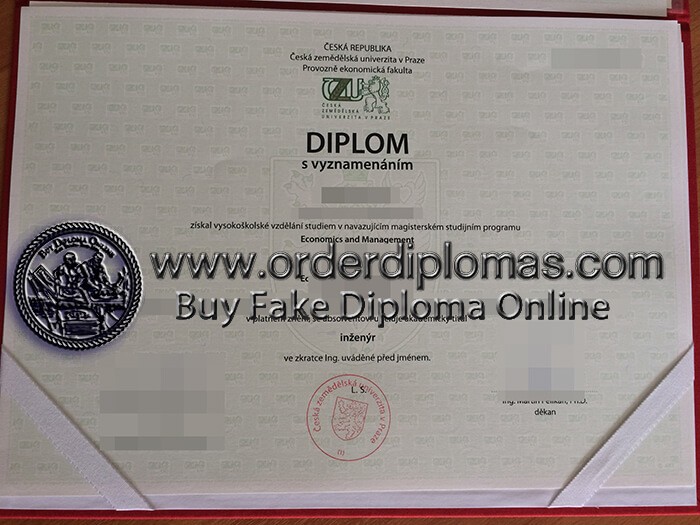
buy fake ceska zemedelska univerzita v praze degree
Buy fake ceska zemedelska univerzita v praze diploma, buy fake ceska zemedelska univerzita v praze degree, buy fake ceska zemedelska univerzita v praze certificate, make fake diploma, buy fake diploma, buy fake degree, order fake diploma, buy fake diploma online.
Czech University of Life Sciences Prague (CZU; (Czech: Česká zemědělská univerzita v Praze), ČZU; also Czech University of Agriculture in Prague) is a university of agricultural education and research in Prague, the Czech Republic, established in 1906.
History
Studies of agriculture were established at the Czech Technical University (ČVUT) in 1906, and the first agricultural engineers graduated in 1911. In 1920 the Faculty of Agriculture and Forestry was established, and in 1952 the faculty became an independent institution, University College of Agriculture in Prague (Czech: Vysoká škola zemědělská v Praze; VŠZ). In 1966 it moved to a newly built campus in Prague-Suchdol, where it has been located since.
The Faculty of Forestry, established in 1952, was part of ČVUT until 1959, buy fake ceska zemedelska univerzita v praze degree, buy fake ceska zemedelska univerzita v praze certificate, make fake diploma, buy fake diploma, then a part of the agricultural university until 1964, when it became the independent Institute of Forestry Science (Czech: Vědecký lesnický ústav). It has been a part of ČZU since 1990.
The university adopted its current name in 1995.
During communist rule in Czechoslovakia, the university was lavishly funded as part of state support of collectivised agriculture.
From 1952 to 1980 the master’s degree offered by the university lasted five years. It then switched to a four-year course from 1980–90, before switching back to five years. Since 1993 three-year bachelor study has also been available.
Academics
The university offers bachelors’ programmes and Master’s programmes (based on credit system) and doctoral programmes.
The university offer now includes a total of 40 programmes taught in English, approximately 15 of which are in the bachelor level and 25 in the master’s level of studies. buy fake diploma, buy fake degree.
The Secretary of the Interfaculty Committee Agraria is located at CULS. In 2005 the Czech University of Life Sciences (CULS) became a member of the Euroleague for Life Sciences (ELLS), and it is also a member of the Biofector project.
The University Farm at Lány is an educational facility, founded in 1960 on a farm that had previously belonged to the Office of the President of the Czechoslovak Republic. Surrounding the farm were properties established in around 1850 as part of the Křivoklát Estate. In 1921 they were purchased by the Czechoslovak state together with Lány Castle and the forest districts. The castle and adjacent forests are now used as a retreat by the President of the Czech Republic. The farm is used for practical training for students of the university as well as other agricultural schools and the public. It participates in the research work undertaken by departments and faculties of the university. The farm cultivates 3,000 hectares of farmland with annual production of about 9,000 tonnes of grain, 2,000 tonnes oilseed rape and fodder crops for the farm’s own use.
As a gene pool, the University Farm rears a herd of original Czech Red cattle, Kladruber horses and Norik horses. There is also a herd of common elands and guanacos, on which research is being conducted into domestication and utilisation as alternative species for extensive farming in temperate climate.
The Mělník farm north east of Prague cultivates 11 hectares of grapevines and produces its own wine. Apricots, peaches and apples are also grown on 4.5 hectares of land. The University Farm has 1,100 head of cattle, of which 440 are Holsteins with annual production of 9,400 litres of milk, and 80 are Jerseys with annual production of 5,900 litres milk. The farm also rears about 4,000 head of pigs, which produce approximately 400 tonnes of pig meat annually. The farm produces 600,000 chickens each year, which are slaughtered and processed in the farm’s own slaughterhouses.

 USA Diplomas
USA Diplomas Canada Diplomas
Canada Diplomas UK Diplomas
UK Diplomas Australia Diplomas
Australia Diplomas Germany Diplomas
Germany Diplomas Malaysia Diplomas
Malaysia Diplomas Singapore Diplomas
Singapore Diplomas Other countries
Other countries Transcript-Form.xlsx
Transcript-Form.xlsx
